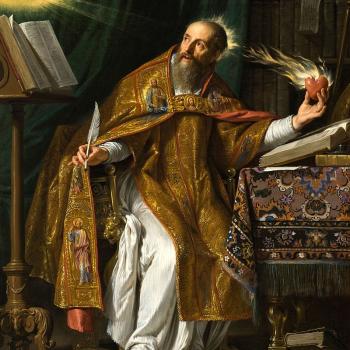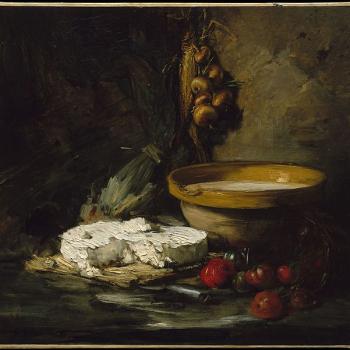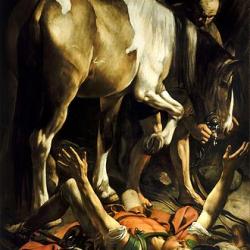Pope Francis has officially given the office of Peter his letter of resignation. It was signed with his death. The memories of what he did are stored away for the current and future generations to look at and ponder. One fine way to reflect on the papacy of Pope Francis is to read what he wrote or spoke. The Vatican website is chock full of his writings. I’ve combed through the archives of his papal documents and gathered a sampling of some of his writings so that you may get a taste of the rich offerings he has give the bride of Christ. He invites all and shares with all words of Faith, Hope, and Love to inspire a renewed commitment to loving God and neighbor.
2013
1. The light of Faith: this is how the Church’s tradition speaks of the great gift brought by Jesus. In John’s Gospel, Christ says of himself: “I have come as light into the world, that whoever believes in me may not remain in darkness” (Jn 12:46).
8. Faith opens the way before us and accompanies our steps through time. Hence, if we want to understand what faith is, we need to follow the route it has taken, the path trodden by believers, as witnessed first in the Old Testament. Here a unique place belongs to Abraham, our father in faith. Something disturbing takes place in his life: God speaks to him; he reveals himself as a God who speaks and calls his name. Faith is linked to hearing. Abraham does not see God, but hears his voice. Faith thus takes on a personal aspect. God is not the god of a particular place, or a deity linked to specific sacred time, but the God of a person, the God of Abraham, Isaac and Jacob, capable of interacting with man and establishing a covenant with him. Faith is our response to a word which engages us personally, to a “Thou” who calls us by name. –Lumen fidei (29 June 2013) | Francis

3. I invite all Christians, everywhere, at this very moment, to a renewed personal encounter with Jesus Christ, or at least an openness to letting him encounter them; I ask all of you to do this unfailingly each day. No one should think that this invitation is not meant for him or her, since “no one is excluded from the joy brought by the Lord”.[1] The Lord does not disappoint those who take this risk; whenever we take a step towards Jesus, we come to realize that he is already there, waiting for us with open arms. Now is the time to say to Jesus: “Lord, I have let myself be deceived; in a thousand ways I have shunned your love, yet here I am once more, to renew my covenant with you. I need you. Save me once again, Lord, take me once more into your redeeming embrace”. How good it feels to come back to him whenever we are lost! Let me say this once more: God never tires of forgiving us; we are the ones who tire of seeking his mercy. Christ, who told us to forgive one another “seventy times seven” (Mt 18:22) has given us his example: he has forgiven us seventy times seven. Time and time again he bears us on his shoulders. No one can strip us of the dignity bestowed upon us by this boundless and unfailing love. With a tenderness which never disappoints, but is always capable of restoring our joy, he makes it possible for us to lift up our heads and to start anew. Let us not flee from the resurrection of Jesus, let us never give up, come what will. May nothing inspire more than his life, which impels us onwards!
2014
This Spirit is the power of life which made the womb of the Virgin Mary fruitful; and it is the same power which inspires the efforts and work of all builders of peace. Wherever a man or woman is a builder of peace, it is the Holy Spirit who is assisting them, moving them to make peace. Two roads intersect today: the Feast of Mary the Most Holy Mother of God and the World Day of Peace. Eight days ago the angelic proclamation rang out: “Glory to God and peace to all men”. Today we welcome it anew from the Mother of Jesus, who “kept all these things, pondering them in her heart” (Lk 2:19), in order to make of it our commitment over the course of the year which has just commenced.
From every corner of the globe, today believers offer up their prayers asking the Lord for the gift of peace and the ability to bring it into every environment. On this first day of the year, may the Lord help us all to set out more decisively on the path of justice and peace. And let us begin at home! Justice and peace at home, among ourselves. It begins at home and then goes out to all humanity. But we have to begin at home. May the Holy Spirit act in hearts, may he melt obstacles and hardness and grant that we may be moved before the weakness of the Baby Jesus. Peace, in fact, requires the strength of meekness, the nonviolent strength of truth and love.

Artist: Sassoferrato Date made: 1640-50 Copyright © The National Gallery, London
With filial trust, let us place our hopes in the hands of Mary, the Mother of the Redeemer. To she who extends her motherhood to all mankind, let us entrust the cry for peace of peoples who are oppressed by war and violence, so that the courage of dialogue and reconciliation might prevail over temptations to revenge, tyranny and corruption. Let us ask her to grant that the Gospel of fraternity, which the Church proclaims and to which she bears witness, may speak to every conscience and bring down the walls that prevent enemies from recognizing one another as brothers.
Angelus, 1 January 2014, Solemnity of Mary, Mother of God | Francis
2015
3. More than fifty years ago, with the world teetering on the brink of nuclear crisis, Pope Saint John XXIII wrote an Encyclical which not only rejected war but offered a proposal for peace. He addressed his message Pacem in Terris to the entire “Catholic world” and indeed “to all men and women of good will”. Now, faced as we are with global environmental deterioration, I wish to address every person living on this planet. In my Apostolic Exhortation Evangelii Gaudium, I wrote to all the members of the Church with the aim of encouraging ongoing missionary renewal. In this Encyclical, I would like to enter into dialogue with all people about our common home.
4. In 1971, eight years after Pacem in Terris, Blessed Pope Paul VI referred to the ecological concern as “a tragic consequence” of unchecked human activity: “Due to an ill-considered exploitation of nature, humanity runs the risk of destroying it and becoming in turn a victim of this degradation”

5. Saint John Paul II became increasingly concerned about this issue. In his first Encyclical he warned that human beings frequently seem “to see no other meaning in their natural environment than what serves for immediate use and consumption”
6. My predecessor Benedict XVI likewise proposed “eliminating the structural causes of the dysfunctions of the world economy and correcting models of growth which have proved incapable of ensuring respect for the environment”.[10] He observed that the world cannot be analyzed by isolating only one of its aspects, since “the book of nature is one and indivisible”, and includes the environment, life, sexuality, the family, social relations, and so forth. It follows that “the deterioration of nature is closely connected to the culture which shapes human coexistence”
7. These statements of the Popes echo the reflections of numerous scientists, philosophers, theologians and civic groups, all of which have enriched the Church’s thinking on these questions. Outside the Catholic Church, other Churches and Christian communities – and other religions as well – have expressed deep concern and offered valuable reflections on issues which all of us find disturbing.
Laudato si’ (24 May 2015) | Francis
2016
Brothers and sisters, you represent the large and varied world of voluntary workers. You are among the most precious things the Church has, you who every day, often silently and unassumingly, give shape and visibility to mercy. You are crafters of mercy: with your hands, with your eyes, with your hearing, with your closeness, by your touch… craftsmen! You express one of the most noble desires of the human heart, making a suffering person feel loved. In the different contexts of need of so many people, your presence is the hand of Christ held out to all, and reaching all. You are the hand of Christ held out: have you thought about this?
The credibility of the Church is also conveyed in a convincing way through your service to abandoned children, to the sick, the poor who lack food or work, to the elderly, the homeless, prisoners, refugees and immigrants, to all struck by natural disasters… Indeed, wherever there is a cry for help, there your active and selfless witness is found. In bearing one another’s burdens, you make Christ’s law visible (cf. Gal 6:2; Jn 13:34).

Dear brothers and sisters, you touch the flesh of Christ with your hands: do not forget this. You touch the flesh of Christ with your hands.
Tomorrow we will have the joy of seeing Mother Teresa proclaimed a saint. She deserves it! This witness to mercy in our time will join the vast array of men and women who, by their holiness of life, have made the love of Christ visible. Let us also imitate their example, as we ask to be humble instruments in God’s hands in order to alleviate the world’s sufferings, and to share the joy and hope of the resurrection. Thank you.
Catechesis for all workers of mercy and volunteers (3 September 2016) | Francis
2017
I would also remind you of the words that Jesus once said to the disciples who asked him: “Teacher […], where are you staying?” He replied, “Come and see” (John 1:38). Jesus looks at you and invites you to go with him. Dear young people, have you noticed this look towards you? Have you heard this voice? Have you felt this urge to undertake this journey? I am sure that, despite the noise and confusion seemingly prevalent in the world, this call continues to resonate in the depths of your heart so as to open it to joy in its fullness. This will be possible to the extent that, even with professional guides, you will learn how to undertake a journey of discernment to discover God’s plan in your life. Even when the journey is uncertain and you fall, God, rich in mercy, will extend his hand to pick you up.
In Kraków, at the opening of the last World Youth Day, I asked you several times: “Can we change things?” And you shouted: “Yes!” That shout came from your young and youthful hearts, which do not tolerate injustice and cannot bow to a “throw-away culture” nor give in to the globalization of indifference. Listen to the cry arising from your inner selves! Even when you feel, like the prophet Jeremiah, the inexperience of youth, God encourages you to go where He sends you: “Do not be afraid, […], because I am with you to deliver you” (Jeremiah 1:8).

A better world can be built also as a result of your efforts, your desire to change and your generosity. Do not be afraid to listen to the Spirit who proposes bold choices; do not delay when your conscience asks you to take risks in following the Master. The Church also wishes to listen to your voice, your sensitivities and your faith; even your doubts and your criticism. Make your voice heard, let it resonate in communities and let it be heard by your shepherds of souls. St. Benedict urged the abbots to consult, even the young, before any important decision, because “the Lord often reveals to the younger what is best” (Rule of St. Benedict, III, 3).
Letter to Young People Letter to Young People on the Occasion of the Presentation of the Preparatory Document of the Fifteenth Ordinary General Assembly of the Synod of Bishops, Given at the Vatican, January 13, 2017
2018
The task of bearing witness to this Good News is not easy. Yet the challenges that Christians face today are, in their own way, no less difficult than those faced by the earliest Irish missionaries. I think of Saint Columbanus, who with his small band of companions brought the light of the Gospel to the lands of Europe in an age of darkness and cultural dissolution. Their extraordinary missionary success was not based on tactical methods or strategic plans, no, but on a humble and liberating docility to the promptings of the Holy Spirit. It was their daily witness of fidelity to Christ and to each other that won hearts yearning for a word of grace and helped give birth to the culture of Europe. That witness remains a perennial source of spiritual and missionary renewal for God’s holy and faithful people.
Of course, there will always be people who resist the Good News, who “murmur” at its “hard words”. Yet like Saint Columbanus and his companions, who faced icy waters and stormy seas to follow Jesus, may we never be swayed or discouraged by the icy stare of indifference or the stormy winds of hostility.

But let us also humbly acknowledge that, if we are honest with ourselves, we too can find the teachings of Jesus hard. How difficult it is always to forgive those who hurt us; how challenging always to welcome the migrant and the stranger; how painful joyfully to bear disappointment, rejection, betrayal; how inconvenient to protect the rights of the most vulnerable, the unborn or the elderly, who seem to impinge upon our own sense of freedom.
Yet it is precisely at those times that the Lord asks us: “What about you, do you want to go away too?” (Jn 6:67). With the strength of the Spirit to “encourage” us and with the Lord always at our side, we can answer: “We believe; we know that you are the Holy One of God” (v. 69). With the people of Israel, we can repeat: “We too will serve the Lord, for he is our God” (Jos 24:18).
Apostolic Visit to Ireland: Holy Mass in Phoenix Park (Dublin, 26 August 2018) | Francis
2019
Here in Japan, in a society with a highly developed economy, the young people I met this morning spoke to me about the many people who are socially isolated. They remain on the margins, unable to grasp the meaning of life and their own existence. Increasingly, the home, school and community, which are meant to be places where we support and help one another, are being eroded by excessive competition in the pursuit of profit and efficiency. Many people feel confused and anxious; they are overwhelmed by so many demands and worries that take away their peace and stability.
The Lord’s words act as a refreshing balm, when he tells us not to be troubled but to trust. Three times he insists: “Do not be anxious about your life… about tomorrow” (cf. Mt 6:25.31.34). This is not an encouragement to ignore what happens around us or to be irresponsible about our daily duties and responsibilities. Instead, it is an invitation to set our priorities against a broader horizon of meaning and thus find the freedom to see things his way: “Seek first the kingdom of God and his righteousness, and all these things shall be yours as well” (Mt 6:33).
The Lord is not telling us that basic necessities like food and clothing are unimportant. Rather, he invites us to re-evaluate our daily decisions and not to become trapped or isolated in the pursuit of success at any cost, including the cost of our very lives. Worldly attitudes that look only to one’s own profit or gain in this world, and a selfishness that pursues only individual happiness, in reality leave us profoundly unhappy and enslaved, and hinder the authentic development of a truly harmonious and humane society.
Apostolic Journey to Japan: Holy Mass in the Tokyo Dome (25 November 2019) | Francis

2020
19. A decline in the birthrate, which leads to the aging of the population, together with the relegation of the elderly to a sad and lonely existence, is a subtle way of stating that it is all about us, that our individual concerns are the only thing that matters. In this way, “what is thrown away are not only food and dispensable objects, but often human beings themselves”. [14] We have seen what happened with the elderly in certain places in our world as a result of the coronavirus. They did not have to die that way. Yet something similar had long been occurring during heat waves and in other situations: older people found themselves cruelly abandoned. We fail to realize that, by isolating the elderly and leaving them in the care of others without the closeness and concern of family members, we disfigure and impoverish the family itself. We also end up depriving young people of a necessary connection to their roots and a wisdom that the young cannot achieve on their own.
80. Jesus told the parable of the Good Samaritan in answer to the question: Who is my neighbour? The word “neighbour”, in the society of Jesus’ time, usually meant those nearest us. It was felt that help should be given primarily to those of one’s own group and race. For some Jews of that time, Samaritans were looked down upon, considered impure. They were not among those to be helped. Jesus, himself a Jew, completely transforms this approach. He asks us not to decide who is close enough to be our neighbour, but rather that we ourselves become neighbours to all.
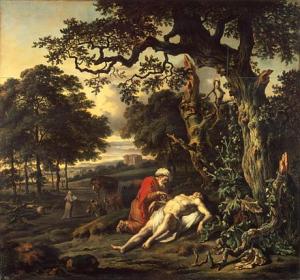
81. Jesus asks us to be present to those in need of help, regardless of whether or not they belong to our social group. In this case, the Samaritan became a neighbour to the wounded Judean. By approaching and making himself present, he crossed all cultural and historical barriers. Jesus concludes the parable by saying: “Go and do likewise” (Lk 10:37). In other words, he challenges us to put aside all differences and, in the face of suffering, to draw near to others with no questions asked. I should no longer say that I have neighbours to help, but that I must myself be a neighbour to others.
Fratelli tutti (3 October 2020) | Francis
2021
Today, we need a new covenant between young and old. We need to share the treasure of life, to dream together, to overcome conflicts between generations and to prepare a future for everyone. Without such a covenantal sharing of life, dreams and future, we risk dying of hunger, as broken relationships, loneliness, selfishness and the forces of disintegration gradually increase. In our societies, we have frequently surrendered to the notion of “every man for himself”. But this is deadly! The Gospel bids us share what we are and what we possess, for only in this way will we find fulfilment. I have often mentioned the words of the prophet Joel about young and old coming together (cf. Joel 3:1). Young people, as prophets of the future, who treasure their own history. The elderly, who continue to dream and share their experience with the young, without standing in their way. Young and old, the treasure of tradition and the freshness of the Spirit. Young and old together. In society and in the Church, together. Holy Mass – World Day for Grandparents and the Elderly (25 July 2021) | Francis
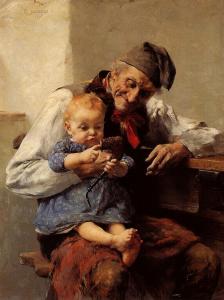
2022
Therefore, Mother of God and our Mother, to your Immaculate Heart we solemnly entrust and consecrate ourselves, the Church and all humanity, especially Russia and Ukraine. Accept this act that we carry out with confidence and love. Grant that war may end and peace spread throughout the world. The “Fiat” that arose from your heart opened the doors of history to the Prince of Peace. We trust that, through your heart, peace will dawn once more. To you we consecrate the future of the whole human family, the needs and expectations of every people, the anxieties and hopes of the world.
Through your intercession, may God’s mercy be poured out on the earth and the gentle rhythm of peace return to mark our days. Our Lady of the “Fiat”, on whom the Holy Spirit descended, restore among us the harmony that comes from God. May you, our “living fountain of hope”, water the dryness of our hearts. In your womb Jesus took flesh; help us to foster the growth of communion. You once trod the streets of our world; lead us now on the paths of peace. Amen.
Act of Consecration to the Immaculate Heart of Mary [25 March 2022] | Francis

Your Camp is called “Alpha”, like the method of evangelization that inspired it. Alpha is another word for birth, a new beginning, the dawn of new life… Christ is “Alpha”, the beginning, but he is also “Omega”, the end, completion and fulfilment. In union with Christ, each of us, as the microcosm we are, can be saved from the abyss of death and negativity, and can enter into the positive attraction of God, life and love. In union with Jesus, each of you becomes a seed destined to blossom, to grow and bear fruit. But we need to follow him! That means saying no to selfishness, to self-centeredness, to wanting to appear other than what we are. No! Saying no to being closed in every form. It means being ourselves, neither puffed up nor downcast, but seeing ourselves for who we are. That is true humility. And, when faced with the evil that is within us and around us, not to escape, not to evade reality, not to close in on ourselves, but to shoulder, each one of us, our own share of responsibility – Jesus says “our own cross” – and to bear it with love and with joy. Not all by ourselves, either, for that is impossible, but always with Jesus, with him leading and ourselves following.
This gives us true peace and security. We are in the presence of Jesus, who knows us and loves us more than we do ourselves, and who wants each of us to find his or her own unique, personal fulfilment. God does not want photocopies, only originals. You know who used to say that? It was Blessed Carlo Acutis, a young Italian born in England and raised in Milan. He was someone like yourselves, a child of this time, passionate about computers and, above all, in love with Jesus and the Eucharist, which he called “the highway to heaven”. Carlo’s life on earth was brief, very brief, but it was a full life. It was like a race, a race to heaven. He set out on that race from the day of his First Holy Communion, when he encountered Jesus in the sacrament of his Body and Blood. Yes, because Jesus is not an idea, or a moral precept. Jesus is a person, a friend, a companion along the way.
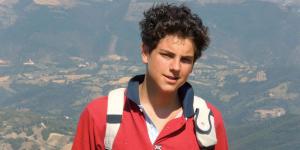
Dear young friends, I leave you with this heat and with this prayer: may Jesus become your great Friend, your Companion along the way. May the living Jesus become your life! Every day and forever. I repeat what Carlo Acutis said: please, don’t be photocopies, but originals, every one of you! Thank you for having come! Enjoy camp and keep pressing forward!
To the participants in the “Alpha Youth Camp” (5 August 2022) | Francis
2023
31. The Story of a Soul is a testimonial to charity, in which Therese offers us a commentary on Jesus’ new commandment: “that you love one another as I have loved you” ( Jn 15:12). [50] Jesus thirsts for this response to his love. Indeed, he “did not fear to beg for a little water from the Samaritan woman. He was thirsty. But when he said ‘Give me to drink’, it was the love of his poor creature that the Creator of the universe was seeking. He was thirsty for love”. [51] Therese wished to respond to the love of Jesus, to offer him love in return for love. [52]
34. The act of love – repeating the words, “Jesus I love you” – which became as natural to Therese as breathing, is the key to her understanding of the Gospel. With that love, she immersed herself in all the mysteries of the life of Christ, making herself his contemporary and placing herself within the Gospel together with Mary and Joseph, Mary Magdalene and the apostles. Together with them, she penetrated to the depths of the love of the Heart of Jesus. Let us take one example: “When I see Magdalene walking up before the many guests, washing with her tears the feet of her adored Master, whom she is touching for the first time, I feel that her heart has understood the abysses of love and mercy of the Heart of Jesus, and, sinner though she is, this Heart of love was not only disposed to pardon her, but to lavish on her the blessings of divine intimacy, to lift her to the highest summits of contemplation”. [57]

During my first ten years as pope, you have heard me every week with the same constant petition: “Pray for me.” I have said this in audiences, the Angelus, and various speeches. You and your prayers, in the case of believers, and good vibes, from those who do not believe, have accompanied me. They have been a permanent source of energy in my continuing forward with the papacy. For this reason, I would like to thank you.
I have the same relationship with God as any other person: a very human one. If you read the Bible, you will find characters who sometimes move away from God, hide from God, and fight with God, like when Abraham bargains with him over the righteous of Sodom (see Genesis 18:23–32). A relationship with God is good when it moves forward along the years, does not remain in its infancy, and is open. It is a bond that matures daily, open to misunderstanding, struggle, and communion that is born every new day. I strive for a relationship like this, even in the dark moments. I know that God is there, not only when I speak. Sometimes I am merely silent and let God talk so that he will make himself known. It is a relationship of coexistence. Other times I do not understand God because he has a particular way of proceeding. But, in any case, one thing I am clear on, and it is how God is with me and with all the world: there is a closeness, a way of compassion, and a tenderness. I hope that my relationship may follow this manner. Sometimes it is formal,
Pope Francis , I Am Asking in the Name of God: Ten Prayers for a Future of Hope (2023). Random House Publishing Group

IV. The Church is the Sacrament of God’s Infinite Love
42. The Church continues to lift up those prayers and supplications that Christ himself—with loud cries and tears—offered in his earthly life (cf. Heb. 5:7), and which enjoy a special efficacy for this reason. In this way, “not only by charity, example, and works of penance, but also by prayer does the ecclesial community exercise a true maternal function in bringing souls to Christ.”[27]
43. The Church is thus the sacrament of God’s infinite love. Therefore, even when a person’s relationship with God is clouded by sin, he can always ask for a blessing, stretching out his hand to God, as Peter did in the storm when he cried out to Jesus, “Lord, save me!” (Mt. 14:30). Indeed, desiring and receiving a blessing can be the possible good in some situations. Pope Francis reminds us that “a small step, in the midst of great human limitations, can be more pleasing to God than a life which appears outwardly in order but moves through the day without confronting great difficulties.”[28] In this way, “what shines forth is the beauty of the saving love of God made manifest in Jesus Christ, who died and rose from the dead.”[29]

44. Any blessing will be an opportunity for a renewed proclamation of the kerygma, an invitation to draw ever closer to the love of Christ. As Pope Benedict XVI taught, “Like Mary, the Church is the mediator of God’s blessing for the world: she receives it in receiving Jesus and she transmits it in bearing Jesus. He is the mercy and the peace that the world, of itself, cannot give, and which it needs always, at least as much as bread.”[30]
45. Taking the above points into account and following the authoritative teaching of Pope Francis, this Dicastery finally wishes to recall that “the root of Christian meekness” is “the ability to feel blessed and the ability to bless […]. This world needs blessings, and we can give blessings and receive blessings. The Father loves us, and the only thing that remains for us is the joy of blessing him, and the joy of thanking him, and of learning from him […] to bless.”[31] In this way, every brother and every sister will be able to feel that, in the Church, they are always pilgrims, always beggars, always loved, and, despite everything, always blessed.
Declaration Fiducia Supplicans On the Pastoral Meaning of Blessings (18 December 2023)
2024
More generally, it must be said that all of us – not just candidates for the priesthood – need a renewed sense of history.
Hence the urgent need for a greater sense of history at a moment when we see a tendency to dismiss the memory of the past or to invent one suited to the requirements of dominant ideologies. Faced with the cancellation of past history or with clearly biased historical narratives, the work of historians, together with knowledge and dissemination of their work, can act as a curb on misrepresentations, partisan efforts at revisionism, and their use to justify wars, persecutions, the production, sale, and utilization of weapons and any number of other evils.
An in-depth, participatory knowledge of history makes clear that we cannot come to grips with the past by hasty interpretations disconnected from their consequences. Reality, past or present, is never a simple phenomenon reducible to naive and dangerous simplifications. Much less to the attempts of those who believe they are like perfect and omnipotent gods and want to cancel part of history and humanity. There may well be horrific moments and atrocious individuals in humanity, but if judgements are made primarily through mass communication and social media, or on the basis of purely political interest, we can be subject to an irrational rush of anger or emotion. In the end, as the saying goes, “Facts taken out of context can only serve as a pretext”. This is where the study of history comes to our aid. Historians can contribute to the understanding of complexity through the rigorous method they employ in interpreting the past. An understanding that is indispensable for transforming the present world and transcending ideological distortions. [5]

A sincere and courageous study of history, then, helps the Church to understand better her relations with different peoples, and these efforts must assist in interpreting and making clear the most difficult and perplexing moments of these peoples. We must not ask people to forget, indeed “we cannot allow present and future generations to lose the memory of what happened… It is a memory that ensures and encourages the building of a more fair and fraternal future”.
26. Saint Bonaventure tells us that in the end we should not pray for light, but for “raging fire”. [17] He teaches that, “faith is in the intellect, in such a way as to provoke affection. In this sense, for example, the knowledge that Christ died for us does not remain knowledge, but necessarily becomes affection, love”. [18] Along the same lines, Saint John Henry Newman took as his motto the phrase Cor ad cor loquitur, since, beyond all our thoughts and ideas, the Lord saves us by speaking to our hearts from his Sacred Heart. This realization led him, the distinguished intellectual, to recognize that his deepest encounter with himself and with the Lord came not from his reading or reflection, but from his prayerful dialogue, heart to heart, with Christ, alive and present. It was in the Eucharist that Newman encountered the living heart of Jesus, capable of setting us free, giving meaning to each moment of our lives, and bestowing true peace: “O most Sacred, most loving Heart of Jesus, Thou art concealed in the Holy Eucharist, and Thou beatest for us still… I worship Thee then with all my best love and awe, with my fervent affection, with my most subdued, most resolved will. O my God, when Thou dost condescend to suffer me to receive Thee, to eat and drink Thee, and Thou for a while takest up Thy abode within me, O make my heart beat with Thy Heart. Purify it of all that is earthly, all that is proud and sensual, all that is hard and cruel, of all perversity, of all disorder, of all deadness. So fill it with Thee, that neither the events of the day nor the circumstances of the time may have power to ruffle it, but that in Thy love and Thy fear it may have peace”. [19]

27. Before the heart of Jesus, living and present, our mind, enlightened by the Spirit, grows in the understanding of his words and our will is moved to put them into practice. This could easily remain on the level of a kind of self-reliant moralism. Hearing and tasting the Lord, and paying him due honour, however, is a matter of the heart. Only the heart is capable of setting our other powers and passions, and our entire person, in a stance of reverence and loving obedience before the Lord.
Dilexit nos (24 October 2024) | Francis
2025
Only those who build bridges can move forward: The builders of walls end up imprisoned by the walls they themselves have built. Most of all, their hearts become entrapped. But the human heart is also the first step along every path of reconciliation. Someone might say: “Ah, Lord God, I don’t know how to speak. I’m too young” (Jeremiah 1:6). I don’t know how peace is made, I’ve had no schooling, I’m not an educated person, I’m not a head of state, I’m still a child, or I’m too old…And there again, the world is too big, too complicated, too far away…But your home, your neighborhood, your place of work, or your school is not too far away, because bullying and abuse of power are also seeds of aggression and war. Your brothers and your sisters are never too far away. Jesus himself tells us in the Gospel how we must act: “I give praise to you, Father, Lord of heaven and earth, for although you have hidden these things from the wise and the learned you have revealed them to the childlike” (Matthew 11:25). Let us be like children, let us be humble, let us be the servants of others. Let us cultivate generosity, kindness, and humility: They are simple acts, the small things pointed out by Saint Paul to an early Christian community at Ephesus (Ephesians 4:1–6) for building peace and strengthening unity in the world, in human society. It’s a teaching that always works, even today. If we want to be able to understand how peace is made, and have the strength to make it, let us all be childlike. Like children holding their grandparents’ hands.
Pope Francis; Hope: The Autobiography (2025) Random House Publishing Group
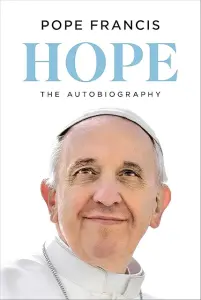
In one of his last homilies on Easter Sunday he said…
For this reason, our Easter faith, which opens us to the encounter with the risen Lord and prepares us to welcome him into our lives, is anything but a complacent settling into some sort of “religious reassurance.” On the contrary, Easter spurs us to action, to run like Mary Magdalene and the disciples; it invites us to have eyes that can “see beyond,” to perceive Jesus, the one who lives, as the God who reveals himself and makes himself present even today, who speaks to us, goes before us, surprises us. Like Mary Magdalene, every day we can experience losing the Lord, but every day we can also run to look for him again, with the certainty that he will allow himself to be found and will fill us with the light of his resurrection.
Sisters, brothers, in the wonder of the Easter faith, carrying in our hearts every expectation of peace and liberation, we can say: with You, O Lord, everything is new. With you, everything begins again.






